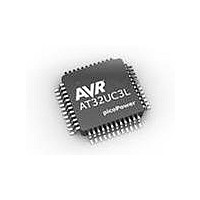AT32UC3L032-D3UR Atmel, AT32UC3L032-D3UR Datasheet - Page 822

AT32UC3L032-D3UR
Manufacturer Part Number
AT32UC3L032-D3UR
Description
MCU AVR32 32KB FLASH 48TLLGA
Manufacturer
Atmel
Series
AVR®32 UC3r
Datasheet
1.AT32UC3L-EK.pdf
(858 pages)
Specifications of AT32UC3L032-D3UR
Core Processor
AVR
Core Size
32-Bit
Speed
50MHz
Connectivity
I²C, SPI, UART/USART
Peripherals
Brown-out Detect/Reset, DMA, PWM, WDT
Number Of I /o
36
Program Memory Size
32KB (32K x 8)
Program Memory Type
FLASH
Ram Size
16K x 8
Voltage - Supply (vcc/vdd)
1.62 V ~ 3.6 V
Data Converters
A/D 9x10b
Oscillator Type
Internal
Operating Temperature
-40°C ~ 85°C
Package / Case
48-TLLGA
Processor Series
AT32UC3x
Core
AVR32
Data Bus Width
32 bit
Data Ram Size
16 KB
Interface Type
SPI, TWI, USART
Maximum Clock Frequency
50 MHz
Number Of Programmable I/os
36
Number Of Timers
7
Maximum Operating Temperature
+ 85 C
Mounting Style
SMD/SMT
3rd Party Development Tools
EWAVR32, EWAVR32-BL
Development Tools By Supplier
AT32UC3L-EK
Minimum Operating Temperature
- 40 C
On-chip Adc
10 bit, 9 Channel
Lead Free Status / RoHS Status
Lead free / RoHS Compliant
Eeprom Size
-
Lead Free Status / Rohs Status
Details
- Current page: 822 of 858
- Download datasheet (13Mb)
35.1.8
35.1.9
32099F–11/2010
SPI
TWI
1. SPI disable does not work in SLAVE mode
2. SPI Bad serial clock generation on 2nd chip select when SCBR==1, CPOL==1, and
3. SPI data transfer hangs with CSR0.CSAAT==1 and MR.MODFDIS==0
4. Disabling SPI has no effect on the SR.TDRE bit
5. SPI mode fault detection enable causes incorrect behavior
1. TWIM.SR.IDLE goes high immediately when NAK is received
Fix / Workaround
Disable the interrupt, clear the interrupt by writing a one to GPIO.IFRC, then enable the
interrupt.
SPI disable does not work in SLAVE mode.
Fix/Workaround
Read the last received data, then perform a software reset by writing a one to the Software
Reset bit in the Control Register (CR.SWRST).
NCPHA==0
W h e n m u l t i p l e c h i p s e l e c t s a r e i n u s e , i f o n e o f t h e b a u d r a t e s i s e q u a l t o 1
(CSRn.SCBR==1) and one of the others is not equal to 1, and CSRn.CPOL==1 and
CSRn.NCPHA==0, an additional pulse will be generated on SCK.
Fix/Workaround
When multiple chip selects are in use, if one of the baudrates is equal to 1, the others must
also be equal to 1 if CSRn.CPOL==1 and CSRn.NCPHA==0.
When CSR0.CSAAT==1 and mode fault detection is enabled (MR.MODFDIS==0), the SPI
module will not start a data transfer.
Fix/Workaround
Disable mode fault detection by writing a one to MR.MODFDIS.
Disabling SPI has no effect on SR.TDRE whereas the write data command is filtered when
SPI is disabled. This means that as soon as the SPI is disabled it becomes impossible to
reset the SR.TDRE bit by writing to TDR. So if the SPI is disabled during a PDCA transfer,
the PDCA will continue to write data to TDR (as SR.TDRE stays high) until its buffer is
empty, and all data written after the disable command is lost.
Fix/Workaround
Disable the PDCA, add 2 NOP (minimum), and disable the SPI. To continue the transfer,
enable the SPI and the PDCA.
When mode fault detection is enabled (MR.MODFDIS==0), the SPI module may not operate
properly.
Fix/Workaround
Always disable mode fault detection before using the SPI by writing a one to MR.MODFDIS.
When a NAK is received and there is a non-zero number of bytes to be transmitted,
SR.IDLE goes high immediately and does not wait for the STOP condition to be sent. This
does not cause any problem just by itself, but can cause a problem if software waits for
SR.IDLE to go high and then immediately disables the TWIM by writing a one to CR.MDIS.
Disabling the TWIM causes the TWCK and TWD pins to go high immediately, so the STOP
condition will not be transmitted correctly.
Fix/Workaround
AT32UC3L016/32/64
822
Related parts for AT32UC3L032-D3UR
Image
Part Number
Description
Manufacturer
Datasheet
Request
R

Part Number:
Description:
KIT DEV/EVAL FOR AT32UC3L0
Manufacturer:
Atmel
Datasheet:

Part Number:
Description:
DEV KIT FOR AVR/AVR32
Manufacturer:
Atmel
Datasheet:

Part Number:
Description:
INTERVAL AND WIPE/WASH WIPER CONTROL IC WITH DELAY
Manufacturer:
ATMEL Corporation
Datasheet:

Part Number:
Description:
Low-Voltage Voice-Switched IC for Hands-Free Operation
Manufacturer:
ATMEL Corporation
Datasheet:

Part Number:
Description:
MONOLITHIC INTEGRATED FEATUREPHONE CIRCUIT
Manufacturer:
ATMEL Corporation
Datasheet:

Part Number:
Description:
AM-FM Receiver IC U4255BM-M
Manufacturer:
ATMEL Corporation
Datasheet:

Part Number:
Description:
Monolithic Integrated Feature Phone Circuit
Manufacturer:
ATMEL Corporation
Datasheet:

Part Number:
Description:
Multistandard Video-IF and Quasi Parallel Sound Processing
Manufacturer:
ATMEL Corporation
Datasheet:

Part Number:
Description:
High-performance EE PLD
Manufacturer:
ATMEL Corporation
Datasheet:

Part Number:
Description:
8-bit Flash Microcontroller
Manufacturer:
ATMEL Corporation
Datasheet:

Part Number:
Description:
2-Wire Serial EEPROM
Manufacturer:
ATMEL Corporation
Datasheet:










